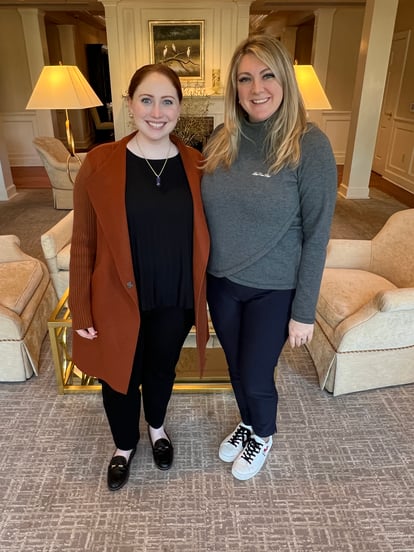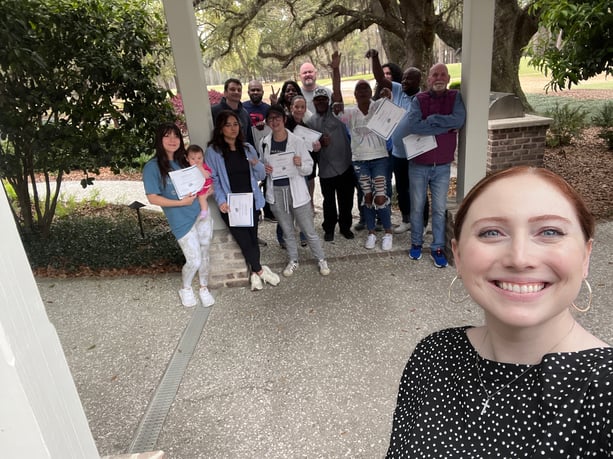
In the exclusive world of private clubs, crafting exceptional experiences is the key to keeping
members happy and engaged. Whether you’re managing a golf club, a social lounge, or an elite
retreat, how you make your members feel can turn a standard visit into a standout memory.
members happy and engaged. Whether you’re managing a golf club, a social lounge, or an elite
retreat, how you make your members feel can turn a standard visit into a standout memory.
At the heart of exceptional hospitality lies what we at RCS call "The Core Four": Welcome,
Comfortable, Understood, and Important. By training your team to master these four principles,
you can elevate every interaction into something that reinforces the value of membership. Let’s
explore each element and how to bring them to life through targeted hospitality training.
Welcome: The First Step into Comfort
The moment a member steps into their club, they’re not just entering a space—they’re stepping
into their sanctuary. A warm, genuine welcome sets the tone, reminding them why they chose
your club to be their home away from home.
Training Tip: Teach your team to greet every member by name with a smile, eye contact, and a
personal touch that says, “This is your place.” Role-play scenarios where staff adapt their
greetings to the member’s needs for the day. For example, an enthusiastic greeting is appropriate
for the member eager to get to the driving range, whereas a calm and familiar greeting works
well for the daily use member unwinding after work. Use phrases like, “Welcome back—we’ve
been expecting you!” or “Great to see you again, Mr. Jones!”
Small gestures, like taking their golf bag or having their favorite drink at the ready, reinforce that
VIP vibe.

Comfortable, Understood, and Important. By training your team to master these four principles,
you can elevate every interaction into something that reinforces the value of membership. Let’s
explore each element and how to bring them to life through targeted hospitality training.
Welcome: The First Step into Comfort
The moment a member steps into their club, they’re not just entering a space—they’re stepping
into their sanctuary. A warm, genuine welcome sets the tone, reminding them why they chose
your club to be their home away from home.
Training Tip: Teach your team to greet every member by name with a smile, eye contact, and a
personal touch that says, “This is your place.” Role-play scenarios where staff adapt their
greetings to the member’s needs for the day. For example, an enthusiastic greeting is appropriate
for the member eager to get to the driving range, whereas a calm and familiar greeting works
well for the daily use member unwinding after work. Use phrases like, “Welcome back—we’ve
been expecting you!” or “Great to see you again, Mr. Jones!”
Small gestures, like taking their golf bag or having their favorite drink at the ready, reinforce that
VIP vibe.

Comfortable: A Haven Tailored to Them
Members join private clubs for an escape, not a hassle. Comfort is more than leather armchairs or
a perfectly manicured green—it’s also about ensuring they feel at ease, whether they’re dining,
networking, or relaxing. A stuffy or impersonal interaction can disrupt that sense of belonging.
Training Tip: Focus on reading body language and anticipating needs. Train staff to spot cues,
or as I like to say, “read the room, or the table”—does the member look rushed, chilly, or ready
to settle in? Equip them with solutions: offer a warm towel after a rainy round, adjust the lighting
in the cigar lounge, or guide them to their favorite corner table.
Members join private clubs for an escape, not a hassle. Comfort is more than leather armchairs or
a perfectly manicured green—it’s also about ensuring they feel at ease, whether they’re dining,
networking, or relaxing. A stuffy or impersonal interaction can disrupt that sense of belonging.
Training Tip: Focus on reading body language and anticipating needs. Train staff to spot cues,
or as I like to say, “read the room, or the table”—does the member look rushed, chilly, or ready
to settle in? Equip them with solutions: offer a warm towel after a rainy round, adjust the lighting
in the cigar lounge, or guide them to their favorite corner table.
Practice empathy exercises where team members imagine they’re the member—putting
themselves into their shoes. What do they need? How do they feel? What would add a special
touch? What could we do to make them feel comfortable? It’s a fantastic way to help shift their
perspective into one of empathy and understanding.
Understood: Hearing What Matters Most
Members expect a club team to know them better than a public venue ever could. Whether
they’re requesting a specific whiskey, asking for a quieter spot, sharing a special event detail, or
themselves into their shoes. What do they need? How do they feel? What would add a special
touch? What could we do to make them feel comfortable? It’s a fantastic way to help shift their
perspective into one of empathy and understanding.
Understood: Hearing What Matters Most
Members expect a club team to know them better than a public venue ever could. Whether
they’re requesting a specific whiskey, asking for a quieter spot, sharing a special event detail, or
providing simple feedback, they want to feel heard. Being understood builds loyalty and proves
their membership matters. And at the end of the day, sometimes a simple “thank you for your
feedback” or maybe a sincere apology acknowledging that you understand how they are feeling
can go a long way.
Training Tip: Emphasize active listening skills. Teach staff to confirm details in a way that
matches your brand. If you are a more casual club, the server may say, “So you’d like the 18-
year-old single malt, neat, right?”. If your club is more on the traditional or upscale side, they
may elevate the question to, “May I confirm – the 18-year-old single malt, served neat?”. The act
of confirming their understanding shows they’re dialed in.
You can also role-play tricky situations, like a member venting about a tee time mix-up or
requesting a custom dish, so staff learn to ask clarifying questions with finesse. A line like, “Let
me make sure I’ve got this perfect for you,” keeps it personal and polished.
Important: Every Member is a VIP
In a private club, every member deserves to feel like they’re the reason the doors stay open—
whether they’re a founding member or just approved to join. We’re not talking about over-the-
top flattery or placating them; we’re talking about genuine respect and recognition.
Training Tip: Train your team to personalize every encounter. Learning and then remembering
a member’s name, recalling their last visit (“How did that golf lesson go?”), or noting a
milestone like an anniversary dinner, shows they’re valued. Encourage small gestures of surprise
and delight—offering a complimentary glass of their go-to wine or a quick “thanks for always
supporting the club” note.
Reinforce ways to personalize service and use a member’s name with team huddles where staff
share stories of making members feel special, sparking ideas and consistency. In this way, the
meeting can also double as an employee recognition event – improving employee engagement.

feedback” or maybe a sincere apology acknowledging that you understand how they are feeling
can go a long way.
Training Tip: Emphasize active listening skills. Teach staff to confirm details in a way that
matches your brand. If you are a more casual club, the server may say, “So you’d like the 18-
year-old single malt, neat, right?”. If your club is more on the traditional or upscale side, they
may elevate the question to, “May I confirm – the 18-year-old single malt, served neat?”. The act
of confirming their understanding shows they’re dialed in.
You can also role-play tricky situations, like a member venting about a tee time mix-up or
requesting a custom dish, so staff learn to ask clarifying questions with finesse. A line like, “Let
me make sure I’ve got this perfect for you,” keeps it personal and polished.
Important: Every Member is a VIP
In a private club, every member deserves to feel like they’re the reason the doors stay open—
whether they’re a founding member or just approved to join. We’re not talking about over-the-
top flattery or placating them; we’re talking about genuine respect and recognition.
Training Tip: Train your team to personalize every encounter. Learning and then remembering
a member’s name, recalling their last visit (“How did that golf lesson go?”), or noting a
milestone like an anniversary dinner, shows they’re valued. Encourage small gestures of surprise
and delight—offering a complimentary glass of their go-to wine or a quick “thanks for always
supporting the club” note.
Reinforce ways to personalize service and use a member’s name with team huddles where staff
share stories of making members feel special, sparking ideas and consistency. In this way, the
meeting can also double as an employee recognition event – improving employee engagement.

Bringing It All Together: The Training Blueprint
To weave "The Core Four" into your private club’s culture, design a training program that’s
hands-on and ongoing. Start with a workshop introducing each principle, using real examples
from your club—like that time a member raved about a perfectly paired glass of wine with their
meal. Then, shift to interactive sessions: mock check-ins at the front desk, dining room service
drills, or handling a member’s special request. Pair new hires with seasoned staff who live these
traits, and schedule regular refreshers to keep standards sharp.
Encourage feedback, too. Ask your team how they feel about delivering "The Core Four" and
what support they need—maybe it’s a cheat sheet of members’ preferences or faster bar restocks.
Remember to lead by example: when club managers embody these principles, it sets the tone for
everyone.
The Return on Your Investment: Loyal Members and a Thriving Club
To weave "The Core Four" into your private club’s culture, design a training program that’s
hands-on and ongoing. Start with a workshop introducing each principle, using real examples
from your club—like that time a member raved about a perfectly paired glass of wine with their
meal. Then, shift to interactive sessions: mock check-ins at the front desk, dining room service
drills, or handling a member’s special request. Pair new hires with seasoned staff who live these
traits, and schedule regular refreshers to keep standards sharp.
Encourage feedback, too. Ask your team how they feel about delivering "The Core Four" and
what support they need—maybe it’s a cheat sheet of members’ preferences or faster bar restocks.
Remember to lead by example: when club managers embody these principles, it sets the tone for
everyone.
The Return on Your Investment: Loyal Members and a Thriving Club
When your staff masters “The Core Four”, the rewards are tangible. Members stay longer, create
positive memories, and bring in friends with glowing reviews. Your team feels empowered,
knowing they’re the backbone of an exclusive experience. And your club? It becomes more than
a destination—it’s a community where members feel they truly belong.
Private club hospitality is about connection and fostering ongoing relationships. By focusing
training on "The Core Four," there are extra perks – while you teach these skills, you’re
cultivating a mindset that turns every member interaction into a testament to why they joined.
So, gather your team, polish those standards, and create a club experience that members will
cherish for years to come.
knowing they’re the backbone of an exclusive experience. And your club? It becomes more than
a destination—it’s a community where members feel they truly belong.
Private club hospitality is about connection and fostering ongoing relationships. By focusing
training on "The Core Four," there are extra perks – while you teach these skills, you’re
cultivating a mindset that turns every member interaction into a testament to why they joined.
So, gather your team, polish those standards, and create a club experience that members will
cherish for years to come.
About the Author of this Blog, Nancy King, MBA:
Nancy is a dedicated hospitality professional with a Master’s in Business Administration, specializing in Hospitality Management. With over 14 years of robust experience in the industry, she has cultivated a deep understanding of the dynamics of hospitality, from the kitchen to front-of-house opera tions. Her career began as a trained pastry chef, where she developed a passion for culinary arts and the nuances of flavor and presentation. This foundational experience ignited her journey into restaurant management, where she successfully led teams, streamlined operations, and enhanced guest satisfaction. Her expertise extends to club management, where she honed her skills in membership services and communications, ensuring a personalized and memorable experience for each member. Her strong communication skills enable her to connect with diverse stakeholders, from team members to guests, fostering a collaborative environment that prioritizes service excellence. In addition to her management roles, she is passionate about training and mentorship. Nancy believes in empowering every team with the knowledge and skills they need to thrive, creating a culture of continuous learning and improvement. Her personable nature allows her to build strong relationships, ensuring a supportive and motivating workplace.
tions. Her career began as a trained pastry chef, where she developed a passion for culinary arts and the nuances of flavor and presentation. This foundational experience ignited her journey into restaurant management, where she successfully led teams, streamlined operations, and enhanced guest satisfaction. Her expertise extends to club management, where she honed her skills in membership services and communications, ensuring a personalized and memorable experience for each member. Her strong communication skills enable her to connect with diverse stakeholders, from team members to guests, fostering a collaborative environment that prioritizes service excellence. In addition to her management roles, she is passionate about training and mentorship. Nancy believes in empowering every team with the knowledge and skills they need to thrive, creating a culture of continuous learning and improvement. Her personable nature allows her to build strong relationships, ensuring a supportive and motivating workplace.
 tions. Her career began as a trained pastry chef, where she developed a passion for culinary arts and the nuances of flavor and presentation. This foundational experience ignited her journey into restaurant management, where she successfully led teams, streamlined operations, and enhanced guest satisfaction. Her expertise extends to club management, where she honed her skills in membership services and communications, ensuring a personalized and memorable experience for each member. Her strong communication skills enable her to connect with diverse stakeholders, from team members to guests, fostering a collaborative environment that prioritizes service excellence. In addition to her management roles, she is passionate about training and mentorship. Nancy believes in empowering every team with the knowledge and skills they need to thrive, creating a culture of continuous learning and improvement. Her personable nature allows her to build strong relationships, ensuring a supportive and motivating workplace.
tions. Her career began as a trained pastry chef, where she developed a passion for culinary arts and the nuances of flavor and presentation. This foundational experience ignited her journey into restaurant management, where she successfully led teams, streamlined operations, and enhanced guest satisfaction. Her expertise extends to club management, where she honed her skills in membership services and communications, ensuring a personalized and memorable experience for each member. Her strong communication skills enable her to connect with diverse stakeholders, from team members to guests, fostering a collaborative environment that prioritizes service excellence. In addition to her management roles, she is passionate about training and mentorship. Nancy believes in empowering every team with the knowledge and skills they need to thrive, creating a culture of continuous learning and improvement. Her personable nature allows her to build strong relationships, ensuring a supportive and motivating workplace.








